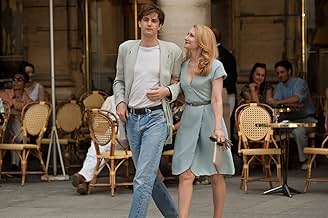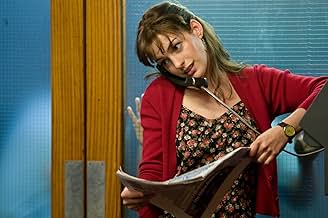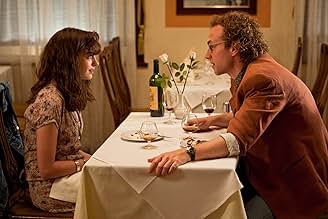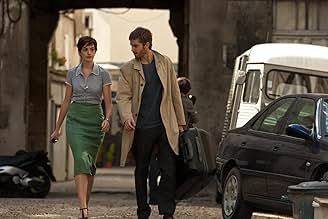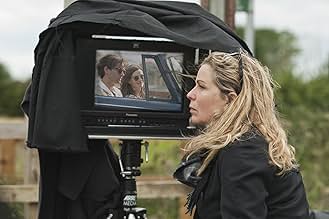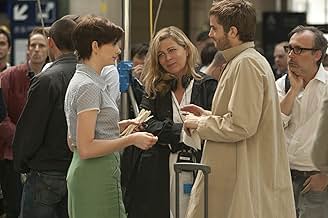Nachdem sie die Nacht zusammen in der Nacht ihres College-Abschlusses verbracht haben, werden Dexter und Emma jedes Jahr am selben Tag gezeigt, um zu sehen, wo sie in ihrem Leben sind. Sie s... Alles lesenNachdem sie die Nacht zusammen in der Nacht ihres College-Abschlusses verbracht haben, werden Dexter und Emma jedes Jahr am selben Tag gezeigt, um zu sehen, wo sie in ihrem Leben sind. Sie sind manchmal zusammen, manchmal nicht, an diesem Tag.Nachdem sie die Nacht zusammen in der Nacht ihres College-Abschlusses verbracht haben, werden Dexter und Emma jedes Jahr am selben Tag gezeigt, um zu sehen, wo sie in ihrem Leben sind. Sie sind manchmal zusammen, manchmal nicht, an diesem Tag.
- Auszeichnungen
- 1 Gewinn & 2 Nominierungen insgesamt
Joséphine de La Baume
- Marie
- (as Josephine De La Baume)
Sutara Gayle
- Mrs. Major
- (as Lorna Gayle)
Empfohlene Bewertungen
Based on David Nichols' bestseller, "One Day" is a more mature Nicholas Sparks version, but equally tearful and melodramatic. Based on a peculiar and intriguing narrative structure, which revisits the 15th of July in the lives of Dexter and Emma since 1988 over more than 20 years, the story focuses on the maturation of the relationship between its characters, fleeing the punctuality and immediacy that surrounds most novels. Ironically, this same artifice reveals the main weakness of the script - others will be seen in the following paragraphs - because the annual reunion with the characters does not hide the considerable loss of information that motivated sudden changes in the life and behavior of each one.
Sensitively directed by the Danish Lone Scherfig ("Education"), who delicately builds the fluid dynamic between Dexter and Emma (Hathaway), One Day is skillful in establishing the passage of time also with the aid of an impeccable make-up job - and notice how Sturgess, in particular, goes from a smooth-faced, jovial boy to a weary middle-aged man with wrinkles and bags under his eyes, while Hathaway emerges chubby (but not exaggeratedly so) after working two years as a waitress in a Mexican restaurant, which is an interesting detail. Benefiting from a competent cast that creates equally complex secondary characters that help compose the journey of the main couple (worth mentioning Rafe Spall, son of Timothy, who transforms the aspiring comedian Ian into a man that is simultaneously pathetic and moving), the film fails here and there by investing in stereotyped characterizations, but still avoiding that they dominate the narrative - and if Dexter's father appears as the typical "cold and critical father", Ken Stott manages to make him softer through occasional hesitations that point out his internal effort to try to get closer to the child.
Likewise, if Nicholls' dialogues are occasionally forced to appeal to exposition in order to clarify what happened to the characters in the previous year, this is balanced by the good construction of so many other lines (especially those spoken by Hathaway), which they display the cold irony typical of British humor (Emma at one point describes the restaurant where she works as a "graveyard of ambitions"). As if that were not enough, the script also creates really sensitive interactions between those people, highlighting the brief and beautiful scene between Dexter and his mother, who, played by Patricia Clarkson, shows melancholy and love when telling her son that, even certain that he will be a good man, realizes that he "isn't there yet".
The dialogues are a strong point of the script, also written by David Nicholls. They are fast, with intelligent insights and manage to perfectly translate the personality of each character and their relationships with each other. Even with silly jokes, like Dexter's mother in Paris saying to her son, "look over there, Alain Delon" ... or not, it's your father", demonstrating how much she is in love with her husband. There are funny scenes too, like when Dexter plays the most famous scene of Spartacus with the dolls for his daughter. But no character is better translated by the dialogues than Emma, the shy girl, but extremely intelligent and sagacious. Each of her lines is a bit of her temperament, feeling, spontaneity.
However, it is even in the construction of Dexter and Emma that "One Day" proves to be particularly efficient: while the boy quickly achieves professional success, the girl struggles for years trying to make her artistic aspirations viable - a situation that gradually reverses as that we perceive that the former lacks the intellectual, emotional and psychological content that sustains his career, while Emma, growing from suffering, reflection and the simple experience of life, gradually transforms herself into a mature woman and ready to overcome the obstacles that previously prevented it from moving forward (and Sturgess and Hathaway, talented and charismatic, confidently illustrate these changes).
The problem is that Hathaway's character quickly becomes the link with the audience. The dreamy sweetness, the sweetness and the detachment transform Emma into a very pleasant company, something that Dexter cannot see. Unsympathetic, self-centered and narcissistic, he uses Emma more as someone to quench the loneliness caused by her personality and assuage her pain and addictions than as a true friendship. Played by the expressionless Sturgess and his characteristic face of suffering, it is practically impossible to believe the beautiful and sensitive Emma fell in love with the guy after a disastrous dinner in which he exposes her (dis)interest. In this way, she emerges as the tragic anchor of the narrative, surrendering herself to the loves of a person she does not love, just to fill the sentimental need. What is revealed in the most cliché of sentences, enunciated according to the Nicholas Sparks booklet: "she made him decent; you made her happy".
As Emma and Dexter mature, the adolescent, dreamy and inconsequential traits give way to realistic, cynical and disillusioned versions, propelled by tragedies, some of them approached with excessive disregard and disengagement due to the narrative structure - yet another negative effect of this. Elevated to the status of protagonist, an incorrect and questionable decision, Dexter undergoes a wide dramatic arc from his mother's illness (Clarkson), the cancellation of the television program, his marriage to Sylvie (Romola Garai, the young woman from "Desire and Reparation" and increasingly better actress), to an event that would definitely humanize him. At times, Emma's life is described in terms of her dream of becoming a writer or her relationship with Ian (Rafe Spall), which is disappointing.
By scrutinizing and dissecting fractions of those characters' lives, certain moments should be more appropriately explored in David Nicholls' script. Dexter's firing after a botched interview and being hired on a video game show lacks a glimpse into the character's journey, though we understand what led to this precipitous fall. Similarly, Emma's relationship with Ian, presented at a dinner party without sparks or the guy's inability to make jokes, culminates in the explanation that she can't "take him watching Wrath of Khan every day anymore". This excessive exposition becomes constant in the film, requiring that a character needs to contextualize the events that are taking place to the public, which exposes the artificiality of the undertaking; well, if Emma and Dexter are such good friends, it was expected that he would reveal the bad news in the expected time and not months later.
On the other hand, the annual narrative is well explored by Danish director Lone Scherfig, and the use of raccords and ellipses in Barney Pilling's montage stands out. And not just temporality, but the duo of characters allows Benoît Delhomme's photography to individualize Emma's trajectory in a nostalgic sepia, while Dexter is bathed in a depressing bluish color palette. Finally, Rachel Portman's score avoids being too intrusive, competently punctuating the narrative. Yes, the idea is curious and the narrative exercise valid (albeit flawed). The trajectory of two people is drawn before our eyes and, let's face it, it's not something usual in novel production. It is a pity, therefore, that the chosen 15th of July sounds hopelessly clichéd and expositional, making the unknown 364 remaining days of each year seem more interesting by comparison.
We cannot, however, say that the film is not romantic. It has its moments, even if it prepares us to tears in such an obvious and brief way. Soon we will be in the next year, and the year after that, forgetting the pain and moving on. But that doesn't stop us from living in the moment. They are brief, it is true, but true and well-constructed. Especially in the final act, where we desperately want to go back to the beginning, as an attempt to remake the story, or at least fool our minds with that simple encounter in the middle of the street and a kiss seals the love story that should have been. Director Lone Scherfig managed to bring delicacy to the story of Emma and Dexter, making "One Day" a sensitive film. A love story built without resources common to films of this nature. Everything is almost realistic and fearful as life. She regrets that, when the situation picks up, she pulls the rug out from under us, with a cliché situation, announced, made just to make us cry. And she didn't even make it. Still, a good movie of its kind.
Sensitively directed by the Danish Lone Scherfig ("Education"), who delicately builds the fluid dynamic between Dexter and Emma (Hathaway), One Day is skillful in establishing the passage of time also with the aid of an impeccable make-up job - and notice how Sturgess, in particular, goes from a smooth-faced, jovial boy to a weary middle-aged man with wrinkles and bags under his eyes, while Hathaway emerges chubby (but not exaggeratedly so) after working two years as a waitress in a Mexican restaurant, which is an interesting detail. Benefiting from a competent cast that creates equally complex secondary characters that help compose the journey of the main couple (worth mentioning Rafe Spall, son of Timothy, who transforms the aspiring comedian Ian into a man that is simultaneously pathetic and moving), the film fails here and there by investing in stereotyped characterizations, but still avoiding that they dominate the narrative - and if Dexter's father appears as the typical "cold and critical father", Ken Stott manages to make him softer through occasional hesitations that point out his internal effort to try to get closer to the child.
Likewise, if Nicholls' dialogues are occasionally forced to appeal to exposition in order to clarify what happened to the characters in the previous year, this is balanced by the good construction of so many other lines (especially those spoken by Hathaway), which they display the cold irony typical of British humor (Emma at one point describes the restaurant where she works as a "graveyard of ambitions"). As if that were not enough, the script also creates really sensitive interactions between those people, highlighting the brief and beautiful scene between Dexter and his mother, who, played by Patricia Clarkson, shows melancholy and love when telling her son that, even certain that he will be a good man, realizes that he "isn't there yet".
The dialogues are a strong point of the script, also written by David Nicholls. They are fast, with intelligent insights and manage to perfectly translate the personality of each character and their relationships with each other. Even with silly jokes, like Dexter's mother in Paris saying to her son, "look over there, Alain Delon" ... or not, it's your father", demonstrating how much she is in love with her husband. There are funny scenes too, like when Dexter plays the most famous scene of Spartacus with the dolls for his daughter. But no character is better translated by the dialogues than Emma, the shy girl, but extremely intelligent and sagacious. Each of her lines is a bit of her temperament, feeling, spontaneity.
However, it is even in the construction of Dexter and Emma that "One Day" proves to be particularly efficient: while the boy quickly achieves professional success, the girl struggles for years trying to make her artistic aspirations viable - a situation that gradually reverses as that we perceive that the former lacks the intellectual, emotional and psychological content that sustains his career, while Emma, growing from suffering, reflection and the simple experience of life, gradually transforms herself into a mature woman and ready to overcome the obstacles that previously prevented it from moving forward (and Sturgess and Hathaway, talented and charismatic, confidently illustrate these changes).
The problem is that Hathaway's character quickly becomes the link with the audience. The dreamy sweetness, the sweetness and the detachment transform Emma into a very pleasant company, something that Dexter cannot see. Unsympathetic, self-centered and narcissistic, he uses Emma more as someone to quench the loneliness caused by her personality and assuage her pain and addictions than as a true friendship. Played by the expressionless Sturgess and his characteristic face of suffering, it is practically impossible to believe the beautiful and sensitive Emma fell in love with the guy after a disastrous dinner in which he exposes her (dis)interest. In this way, she emerges as the tragic anchor of the narrative, surrendering herself to the loves of a person she does not love, just to fill the sentimental need. What is revealed in the most cliché of sentences, enunciated according to the Nicholas Sparks booklet: "she made him decent; you made her happy".
As Emma and Dexter mature, the adolescent, dreamy and inconsequential traits give way to realistic, cynical and disillusioned versions, propelled by tragedies, some of them approached with excessive disregard and disengagement due to the narrative structure - yet another negative effect of this. Elevated to the status of protagonist, an incorrect and questionable decision, Dexter undergoes a wide dramatic arc from his mother's illness (Clarkson), the cancellation of the television program, his marriage to Sylvie (Romola Garai, the young woman from "Desire and Reparation" and increasingly better actress), to an event that would definitely humanize him. At times, Emma's life is described in terms of her dream of becoming a writer or her relationship with Ian (Rafe Spall), which is disappointing.
By scrutinizing and dissecting fractions of those characters' lives, certain moments should be more appropriately explored in David Nicholls' script. Dexter's firing after a botched interview and being hired on a video game show lacks a glimpse into the character's journey, though we understand what led to this precipitous fall. Similarly, Emma's relationship with Ian, presented at a dinner party without sparks or the guy's inability to make jokes, culminates in the explanation that she can't "take him watching Wrath of Khan every day anymore". This excessive exposition becomes constant in the film, requiring that a character needs to contextualize the events that are taking place to the public, which exposes the artificiality of the undertaking; well, if Emma and Dexter are such good friends, it was expected that he would reveal the bad news in the expected time and not months later.
On the other hand, the annual narrative is well explored by Danish director Lone Scherfig, and the use of raccords and ellipses in Barney Pilling's montage stands out. And not just temporality, but the duo of characters allows Benoît Delhomme's photography to individualize Emma's trajectory in a nostalgic sepia, while Dexter is bathed in a depressing bluish color palette. Finally, Rachel Portman's score avoids being too intrusive, competently punctuating the narrative. Yes, the idea is curious and the narrative exercise valid (albeit flawed). The trajectory of two people is drawn before our eyes and, let's face it, it's not something usual in novel production. It is a pity, therefore, that the chosen 15th of July sounds hopelessly clichéd and expositional, making the unknown 364 remaining days of each year seem more interesting by comparison.
We cannot, however, say that the film is not romantic. It has its moments, even if it prepares us to tears in such an obvious and brief way. Soon we will be in the next year, and the year after that, forgetting the pain and moving on. But that doesn't stop us from living in the moment. They are brief, it is true, but true and well-constructed. Especially in the final act, where we desperately want to go back to the beginning, as an attempt to remake the story, or at least fool our minds with that simple encounter in the middle of the street and a kiss seals the love story that should have been. Director Lone Scherfig managed to bring delicacy to the story of Emma and Dexter, making "One Day" a sensitive film. A love story built without resources common to films of this nature. Everything is almost realistic and fearful as life. She regrets that, when the situation picks up, she pulls the rug out from under us, with a cliché situation, announced, made just to make us cry. And she didn't even make it. Still, a good movie of its kind.
I had watched "One Day" yesterday and was beyond excited because I had read the novel by David Nicholls, which was fantastic. The movie base's around 2 people and their twenty years together, shown only through one day, July 15th. I thought the plot was unique and was a very realistic romance. Sometimes it takes people a lot to lose to realize what life is about, and how certain people are truly important to you. The movie was cute, funny, and quite sad at times. I thought Anne Hathaway did an okay job on the accent, to me it was odd at first but after a couple minutes I had gotten used to it. Her acting was great and you can really see her changing as the years progress. Jim Sturgess was great and in my opinion really portrayed Dexter the best as possible, with the arrogance and attitude exactly as I imagined Dexter would have. In my own opinion the movie was a great watch, was a romance that I had been dying for ever sense The Notebook. Finally a tear jerking but smile at the end movie, that really anyone can enjoy, if your looking for a romance movie.
"One Day", based on the novel of the same name, is the relationship of two people, Emma (Anne Hathaway) and Dexter (Jim Sturgess), as we see it on July 15th of each year. As can be expected from the nature of the story, it's a little dry, lacking in comedy. But then again, it's a romantic drama, not a romantic comedy.
As is the nature of the two media, movies can never be exactly the same as the novel. But the problem with this one is that they tried to; no story lines were removed. Almost everything was there, just shortened into mostly meaningless segments. I personally could have done with one less event in their lives, and perhaps a different ending, but they tried to be as faithful as possible.
What we have here is a movie about a relationship, but the novel was about the people. They traded in character depth and development so we can see them in their more attractive years falling in and out of love.
I wasn't very familiar with Jim Sturgess, having seen him play skinny, slightly nerdy, not as confident kids. Dexter is a different breed of guy. Just has high on self-confidence as he is on drugs and alcohol, he gets by on his looks – literally – he's a TV host. Although the different characteristics of Dexter weren't explicitly shown in the movie, Sturgess brought them out in him perfectly. Emma is a more complex character, with significant evolution to who she is throughout the years, except none of that is in the movie, so it just wasn't really possible for Hathaway to portray her as a more interesting person.
I would assume that watching "One Day" without the benefit of having read the novel would be a fairly confusing, empty experience. With the background that the novel gave me, I could fill in all the missing years and the unexplored layers to the characters, so there was still something to their relationship for me.
As is the nature of the two media, movies can never be exactly the same as the novel. But the problem with this one is that they tried to; no story lines were removed. Almost everything was there, just shortened into mostly meaningless segments. I personally could have done with one less event in their lives, and perhaps a different ending, but they tried to be as faithful as possible.
What we have here is a movie about a relationship, but the novel was about the people. They traded in character depth and development so we can see them in their more attractive years falling in and out of love.
I wasn't very familiar with Jim Sturgess, having seen him play skinny, slightly nerdy, not as confident kids. Dexter is a different breed of guy. Just has high on self-confidence as he is on drugs and alcohol, he gets by on his looks – literally – he's a TV host. Although the different characteristics of Dexter weren't explicitly shown in the movie, Sturgess brought them out in him perfectly. Emma is a more complex character, with significant evolution to who she is throughout the years, except none of that is in the movie, so it just wasn't really possible for Hathaway to portray her as a more interesting person.
I would assume that watching "One Day" without the benefit of having read the novel would be a fairly confusing, empty experience. With the background that the novel gave me, I could fill in all the missing years and the unexplored layers to the characters, so there was still something to their relationship for me.
Greetings from Lithuania.
I don't watch romantic movies often, but when i heard about story of "One day" i thought of giving it a chance. And it sure didn't disappoint me. This is a really good love story, told in a single day in a year in period of 23 years. Movie is beautifully filmed, with great acting by the two leads, especially from Anne Hathaway. She's just so ... beautiful in every meaning of this word. Can't wait to see her next summer in "TDKR". "One day" isn't your typical Hollywood love story and you can clearly FEEL that watching it.
Give this movie a chance and you can be really surprised that when this movie will end, you'll fell your self a little ... brighter.
I don't watch romantic movies often, but when i heard about story of "One day" i thought of giving it a chance. And it sure didn't disappoint me. This is a really good love story, told in a single day in a year in period of 23 years. Movie is beautifully filmed, with great acting by the two leads, especially from Anne Hathaway. She's just so ... beautiful in every meaning of this word. Can't wait to see her next summer in "TDKR". "One day" isn't your typical Hollywood love story and you can clearly FEEL that watching it.
Give this movie a chance and you can be really surprised that when this movie will end, you'll fell your self a little ... brighter.
I went to see One Day last night, and though I had been looking forward to it for a while, I was surprised at how good it actually is.
The film has a very unique atmosphere, as it is much quirkier than your average romance. Also, without giving away the ending, I can say that it isn't as predictable as one might think. What I really liked about it was the complexity of the different human relationships that we are shown. The relationship between Emma and Dexter is by no means an easy one, nor is it one-sided. Given how different they are, there is a lot of conflict between them, although they do love each other. Similarly, what Dexter and his ex-wife feel for one another is never pure hatred, but there is a lot of understanding between them. As a consequence, the story seems like it could be taken from real life.
Plus, both Hathaway and Sturgess are as convincing as always, which makes this film absolutely worth seeing.
The film has a very unique atmosphere, as it is much quirkier than your average romance. Also, without giving away the ending, I can say that it isn't as predictable as one might think. What I really liked about it was the complexity of the different human relationships that we are shown. The relationship between Emma and Dexter is by no means an easy one, nor is it one-sided. Given how different they are, there is a lot of conflict between them, although they do love each other. Similarly, what Dexter and his ex-wife feel for one another is never pure hatred, but there is a lot of understanding between them. As a consequence, the story seems like it could be taken from real life.
Plus, both Hathaway and Sturgess are as convincing as always, which makes this film absolutely worth seeing.
Wusstest du schon
- WissenswertesAnne Hathaway was clandestinely given the script, as director Lone Scherfig was not looking at any American actresses for the part of Emma. Hathaway flew to London for a meeting with Scherfig, which she described as "the worst meeting of my life. I was just inarticulate." However, on leaving Lone, she handed her a list of songs that she felt represented how she would interpret the character. It was this list that landed her the part.
- PatzerEmma and the other students are seen wearing mortarboards as they graduate in Edinburgh, however these are not worn at graduation at the University of Edinburgh (nor generally other universities in Scotland).
- VerbindungenFeatured in Nudes in the News: Show #250 (2011)
- SoundtracksTalkin' 'Bout A Revolution
Words and music by Tracy Chapman
Performed by Tracy Chapman
Licensed Courtesy of Warner Music UK Limited
Top-Auswahl
Melde dich zum Bewerten an und greife auf die Watchlist für personalisierte Empfehlungen zu.
- How long is One Day?Powered by Alexa
- What is the first song she plays on the record player?
Details
- Erscheinungsdatum
- Herkunftsländer
- Offizieller Standort
- Sprache
- Auch bekannt als
- Siempre el mismo día
- Drehorte
- Produktionsfirmen
- Weitere beteiligte Unternehmen bei IMDbPro anzeigen
Box Office
- Budget
- 15.000.000 $ (geschätzt)
- Bruttoertrag in den USA und Kanada
- 13.843.771 $
- Eröffnungswochenende in den USA und in Kanada
- 5.079.566 $
- 21. Aug. 2011
- Weltweiter Bruttoertrag
- 59.389.433 $
- Laufzeit1 Stunde 47 Minuten
- Farbe
- Sound-Mix
- Seitenverhältnis
- 2.35 : 1
Zu dieser Seite beitragen
Bearbeitung vorschlagen oder fehlenden Inhalt hinzufügen








